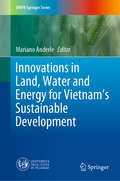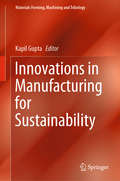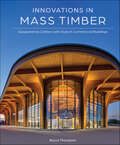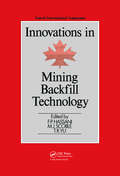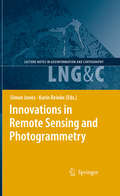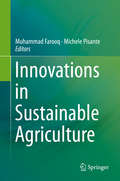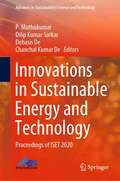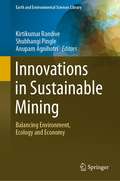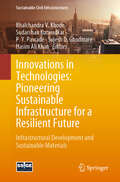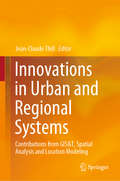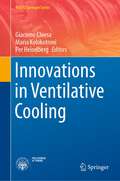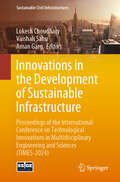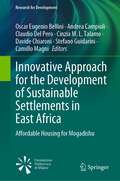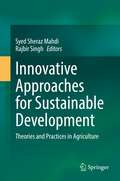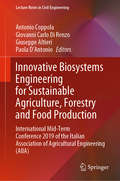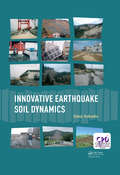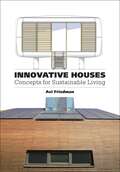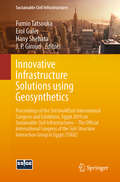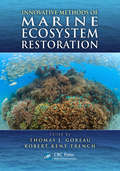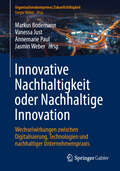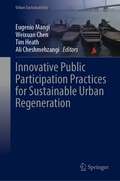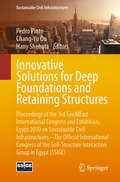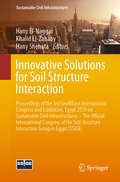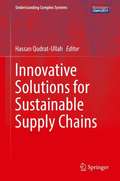- Table View
- List View
Innovations in Land, Water and Energy for Vietnam’s Sustainable Development (UNIPA Springer Series)
by Mariano AnderleThis book presents recent innovative trends in land, water and energy management in Vietnam. Presenting the main projects and outcomes of a close collaboration between Italian and Vietnamese researchers in the last three years, the book is divided into three main sections: environment, climate change and land management in Vietnam; energy for Vietnam; and cities and utilities in Vietnam. The first section focuses on water systems, including rivers and seacoasts, and on new growing methods for more sustainable agriculture. The second section addresses energy and wastewater. The country’s rapid growth is a major challenge in terms of reinforcing the electrical infrastructures, and as such this section offers an overview of the government’s planned measures and their impact on the Vietnamese power system. The third section highlights cities and utilities in the context of increasing urbanization, exploring the urban morphology of the Vietnamese metropolis, particularly Hanoi and Ho Chi Minh City.
Innovations in Manufacturing for Sustainability (Materials Forming, Machining and Tribology)
by Kapil GuptaThis book provides details on the innovations made to achieve sustainability in manufacturing. It highlights the trends of current progress in research and development being done to achieve overall sustainability in manufacturing technology. Green-EDM, Hybrid machining, MQL assisted machining, sustainable casting, welding, finishing and casting, energy- and resource-efficient manufacturing are some of the important topics discussed in this book.
Innovations in Mass Timber: Sequestering Carbon with Style in Commercial Buildings
by Boyce ThompsonTrending topic on which there are few books, none written from a purely design point of view. Wooden Buildings Reach for the Skyhttps://www.nytimes.com/2021/07/30/todaysinyt/wooden-buildings-reach-for-the-sky-in-vaxjo-sweden.html?referringSource=articleShareFive Stories Tall and Made of Woodhttps://www.nytimes.com/2020/01/17/realestate/five-stories-tall-and-made-of-wood.html?referringSource=articleShareAs Concerns Over Climate Change Rise, More Developers Turn to Woodhttps://www.nytimes.com/2020/09/22/business/mass-timber-wood-buildings.html?referringSource=artichttps://www.nytimes.com/2019/11/20/style/engineered-wood-tower-construction.html?.?mc=aud_dev&ad-keywords=auddevgate&gclid=Cj0KCQjwg7KJBhDyARIsAHrAXaHHY8errrxRyekMa3u1yfaO3-hlB6P4tpWt23X1l9NnbkdQxH2J8z8aAtAcEALw_wcB&gclsrc=aw.ds
Innovations in Mining Backfill Technology
by F.P.HASSANI; M.J.SCOBLE; T.R.YUProceedings of the 4th International Symposium held in Montreal, Oct.2-5, 1989. Paper topics include: review, laboratory testing, modelling and design, rockburst control, soft rock mining, and system design.
Innovations in Remote Sensing and Photogrammetry
by Simon Jones Karin ReinkeRemote sensing of our environment is becoming increasingly accessible and important in today's society. This book aims to highlight some of the broad and multi-disciplinary applications, and emerging practices, that remote sensing and photogrammetric technologies lend themselves to. The papers have been selected from the 13th and 14th Australasian Remote Sensing and Photogrammetry Conferences given by experts in remote sensing, spatial analysis and photogrammetry from across the Asia Pacific region. They are presented here as a collection of peer reviewed papers covering research into areas such as data fusion techniques and their applications in environmental monitoring, synoptic monitoring and data processing, terrestrial and marine applications of remote sensing, and photogrammetry.
Innovations in Sustainable Agriculture
by Muhammad Farooq Michele PisanteThis volume is a ready reference on sustainable agriculture and reinforce the understanding for its utilization to develop environmentally sustainable and profitable food production systems. It describes ecological sustainability of farming systems, present innovations for improving efficiency in the use of resources for sustainable agriculture and propose technological options and new areas of research in this very important area of agriculture.
Innovations in Sustainable Energy and Technology: Proceedings of ISET 2020 (Advances in Sustainability Science and Technology)
by P. Muthukumar Dilip Kumar Sarkar Debasis De Chanchal Kumar DeThis book presents best selected research papers presented at Innovation in Sustainable Energy and Technology India (ISET 2020), organized by Energy Institute Bangalore (A unit of RGIPT, an Institute of National Importance), India, during 3–4 December 2020. The book covers various topics of sustainable energy and technologies which includes renewable energy (solar photovoltaic, solar thermal and CSP, biomass, wind energy, micro hydro power, hydrogen energy, geothermal energy, energy materials, energy storage, hybrid energy), smart energy systems (electrical vehicle, cybersecurity, charging infrastructures, IOT & AI, waste management, PHEV (CNG/EV) and mobility (smart grids, IOT & AI, energy-efficient buildings, mart agriculture).
Innovations in Sustainable Mining: Balancing Environment, Ecology and Economy (Earth and Environmental Sciences Library)
by Kirtikumar Randive Shubhangi Pingle Anupam AgnihotriThis book explores sustainable mining knowledge, assessing researchers on the impacts of waste and new approaches to negotiating these impacts. Mining has always been a profitable venture; however, it comes with several boons and banes. The significant advantages of mining include employment generation, the establishment of townships and trade centers, and socio-economic growth. However, the mining activity is a significant cause of environmental degradation, including soils, atmosphere, water, solid wastes, changed topography, and health hazards. This book emphasizes value-added products from mining wastes and innovations for balancing environment, ecology, and economy. This book is designed for miners, policymakers, professionals, researchers, scientists, industrialists, and environmental agencies.
Innovations in Technologies: Infrastructural Development and Sustainable Materials (Sustainable Civil Infrastructures)
by Sudarshan Kurwadkar Bhalchandra V. Khode P. Y. Pawade Sujesh D. Ghodmare Hasim Ali KhanThis book harmoniously unites diverse cosmic perspectives, nurturing a collective understanding of current trends and cosmic challenges. In the book realm of engineering symphonies, the "International Conference on Recent Trends in Infrastructural Development and Sustainable Materials (IC-RTIDSM-2023)" stood tall as a grand compilation of ingenious research. Curated by the visionary Department of Civil Engineering at G H Raisoni College of Engineering, Nagpur, this symposium danced into existence on the 25th and 26th of November 2023, a celestial stage for academia, business professionals, and aspiring engineers to unite in an ethereal exchange of creativity and knowledge. In pursuit of sustainable dreams, the conference ensemble aspired to unravel the secrets of eco-conscious materials and resilient infrastructure. The grand publication titled "International Conference on Recent Trends in Infrastructural Development and Sustainable Materials" adorned the illustrious pages of the esteemed Sustainable Civil Infrastructures book series indexed by Scopus. The grand stage of IC-RTIDSM-2023 sought to integrate the dazzling constellations of ongoing research and innovation from every corner of the globe. United under the cosmic banner of progress, luminaries, practitioners, and researchers merged their brilliance to orchestrate a celestial symphony of knowledge sharing and harmonious collaboration. This celestial chronicle, born from the harmonies of IC-RTIDSM-2023, emerges as a guiding star, illuminating the path of civil engineering's future. In the grand crescendo of its cosmic symphony, the International Conference on Recent Trends in Infrastructural Development and Sustainable Materials (IC-RTIDSM-2023) marks a celestial chapter of knowledge and cosmic cooperation in the realm of civil engineering. The celestial masterpiece borne from this cosmic gathering serves as a guiding star, illuminating the celestial paths of research, policy, and action toward resilient and sustainable civil infrastructures. Like a celestial conductor, it propels humanity forward, orchestrating a celestial ode to the present and future, resounding with the melody of a better tomorrow.
Innovations in Urban and Regional Systems: Contributions from GIS&T, Spatial Analysis and Location Modeling
by Jean-Claude ThillThis book presents cutting‐edge research on urban and regional systems applying modern spatial analytical techniques of Geographic Information Science & Technologies (GIS&T), spatial statistics, and location modeling. The contributions, written by leading scholars from around the globe, adopt a spatially explicit analytical perspective and highlight methodological innovations and substantive breakthroughs on many facets of the socioeconomic and environmental reality of urban and regional contexts. The book is divided into three parts: The first part offers an introduction to the research field, while the second part discusses critical issues in urban growth and urban management, presenting case studies on city and urban environments, their growth, data infrastructures and spatial and management issues. The third part then broadens the analysis to the regional scale, addressing growth, convergence and adaptation to new economic and information‐based realities. This book appeals to scholars of spatial and regional sciences as well as to policy decision-makers interested in advanced methods of spatial analysis, location modeling, and GIS&T.
Innovations in Ventilative Cooling (PoliTO Springer Series)
by Maria Kolokotroni Giacomo Chiesa Per HeiselbergThis book includes the most recent outcomes from research and professional practice in the ventilative cooling field, gathered by the selected panel of authors. It provides essential contents to face and reduce the rise of space cooling and ventilation energy uses in buildings by alternative ventilation and cooling solutions. The book is organised into three parts which include a detailed description of ventilative cooling boundaries and implications (working principles, KPIs, standards, comfort models, control techniques) and of principal techniques (night ventilation, controlled natural ventilation, hybrid solutions, PCM and mass activation, evaporative cooling, earth-to-air heat exchangers) along with an updated analysis of the background to the topic. Furthermore, the last part of the book defines a unique practical and theoretical framework to include ventilative cooling solutions in different building typologies along with their principal implications.
Innovations in the Development of Sustainable Infrastructure: Proceedings of the International Conference on Technological Innovations in Multidisciplinary Engineering and Sciences (TIMES-2024) (Sustainable Civil Infrastructures)
by Lokesh Choudhary Vaishali Sahu Aman GargThis book offers a comprehensive exploration of cutting-edge insights and research in sustainable infrastructure development, offering valuable solutions tailored to meet contemporary challenges. Encompassing a diverse range of topics such as green building technologies, climate-resilient infrastructure, smart applications, and low-carbon construction techniques, it presents essential knowledge for researchers, practitioners, policymakers, and stakeholders alike. With a keen focus on fostering innovation and promoting sustainable practices, this series serves as an indispensable resource for anyone invested in the advancement of sustainable infrastructure. Whether you're an academic seeking the latest research or a professional navigating real-world challenges, this series provides informative, engaging, and thought-provoking content to inspire action and drive positive change. To discover the roadmap to a greener, smarter future --this book series is your guide.
Innovative Approach for the Development of Sustainable Settlements in East Africa: Affordable Housing for Mogadishu (Research for Development)
by Oscar Eugenio Bellini Andrea Campioli Claudio Del Pero Cinzia M. L. Talamo Davide Chiaroni Stefano Guidarini Camillo MagniThis book deals with sustainable affordable housing in developing countries, providing the main results of the BECOMe research project of the Politecnico di Milano. Sustainable, affordable housing in developing countries is increasingly important for African and international stakeholders, with massive urbanization processes involving many countries consuming large territories and natural resources minus any strategy of sustainability and social equality and without consideration of the long-term effects on the environment and subsequent generations. While the issue of affordable housing requires approaches adapted to the many specific African contexts, the case of Somalia seems representative of a fragile context characterized by the uncertainty of the social, political, and economic situations and the lack of common shared legislative references and strategies. The book aims to provide knowledge and propose a methodological framework developed from this particular situation that can serve as a template. On the basis of this main objective, the book deals with approaches and problems related to the creation of sustainable housing ecosystems, activating and boosting local enterprises and stimulating foreign investors to revamp the national AEC sector and related manufacturing industries, models for modular settlements, and business models and assessment methodologies useful for evaluating a set of appropriate technological solutions. Chapters 03 and 07 are available open access under a Creative Commons Attribution 4.0 International License via link.springer.com.
Innovative Approaches for Sustainable Development: Theories and Practices in Agriculture
by Syed Sheraz Mahdi Rajbir SinghThis book provides recent understanding about the sustainable development in agriculture. It includes information regarding new approaches for sustainable development in agriculture, horticulture and fisheries. It examines the effect of climate change and provides information on climate smart practices. In addition, some important aspects like quality seed production, role of bioinoculants, on-farm water harvesting, non-thermal processing of food, importance of water use in organic agriculture have also been discussed. It also presents in detail plant disease aspect and their management strategies. This book aims to provide an overall understanding of all aspects related to the study of environment resources, its protection for sustainable development. To meet the growing food demand of the over nine billion people who will exist by 2050 and the expected dietary changes, agriculture will need to produce 60 percent more food globally in the same period. The goal of sustainable agriculture is to meet society’s food and textile needs in the present without compromising the ability of future generations to meet their own needs. Practitioners of sustainable agriculture seek to integrate three main objectives into their work: a healthy environment, economic profitability, and social and economic equity. Every person involved in the food system growers, food processors, distributors, retailers, consumers, and waste managers can play a role in ensuring a sustainable agricultural system.
Innovative Biosystems Engineering for Sustainable Agriculture, Forestry and Food Production: International Mid-Term Conference 2019 of the Italian Association of Agricultural Engineering (AIIA) (Lecture Notes in Civil Engineering #67)
by Antonio Coppola Giovanni Carlo Di Renzo Giuseppe Altieri Paola D’AntonioThis book gathers the latest advances, innovations, and applications in the field of innovative biosystems engineering for sustainable agriculture, forestry and food production. Focusing on the challenges of implementing sustainability in various contexts in the fields of biosystems engineering, it shows how the research has addressed the sustainable use of renewable and non-renewable resources. It also presents possible solutions to help achieve sustainable production. The Mid-Term Conference of the Italian Association of Agricultural Engineering (AIIA) is part of a series of conferences, seminars and meetings that the AIIA organizes, together with other public and private stakeholders, to promote the creation and dissemination of new knowledge in the sector. The contributions included in the book were selected by means of a rigorous peer-review process, and offer an extensive and multidisciplinary overview of interesting solutions in the field of innovative biosystems engineering for sustainable agriculture.
Innovative Earthquake Soil Dynamics
by Takaji KokushoInnovative Earthquake Soil Dynamics deals with soil dynamics in earthquake engineering and includes almost all aspects of soil behavior. Both generally accepted basic knowledge as well as advanced and innovative views are accommodated. Major topics are (i) seismic site amplification, (ii) liquefaction and (iii) earthquake-induced slope failure. Associated with the above, basic theories and knowledge on wave propagation/attenuation, soil properties, laboratory tests, numerical analyses, and model tests are addressed in the first part of the book. A great number of earthquake observations in surface soil deposits as well as case histories with new findings are addressed in the later chapters, together with associated laboratory test data. Most of the research results originate from Japan, which is rich in earthquake records and case histories, although mostly isolated from the outside world because of the language barrier. Another important feature characterizing this book is an energy perspective in addition to the force-equilibrium perspective, because it is the author’s strong belief that energy is a very relevant index in determining seismic failures, particularly of soils and soil structures. Innovative Earthquake Soil Dynamics is written for international readers, graduate students, researchers, and practicing engineers, interested in this field.
Innovative Houses: Concepts For Sustainable Living
by Avi FriedmanHousing is rapidly having to adapt to the global changes of the twenty first century. These include the transformation of the family and the rise of the non-traditional household, increases in construction costs, and concerns over climate change and the depletion of natural resources. Designing residential environments that address these issues is an urgent priority.This book examines the latest residential design trends that have arisen in response to these challenges. Divided into four broad areas, tightly focused thematic chapters look at twenty discrete topics, such as live/work; adaptable housing; prefabrication; water efficiency; green roofs; and innovative landscaping. Each chapter includes an essay which lays out principles, methods and practices. Using text, drawings and photos from a variety of contemporary international practices, the book demonstrates how these ideas can be applied by architects. It offers a comprehensive collection of strategies and examples that will inspire a much needed housing revolution.
Innovative Houses: Concepts for Sustainable Living
by Avi FriedmanHousing is rapidly having to adapt to the global changes of the twenty first century. These include the transformation of the family and the rise of the non-traditional household, increases in construction costs, and concerns over climate change and the depletion of natural resources. Designing residential environments that address these issues is an urgent priority.This book examines the latest residential design trends that have arisen in response to these challenges. Divided into four broad areas, tightly focused thematic chapters look at twenty discrete topics, such as live/work; adaptable housing; prefabrication; water efficiency; green roofs; and innovative landscaping. Each chapter includes an essay which lays out principles, methods and practices. Using text, drawings and photos from a variety of contemporary international practices, the book demonstrates how these ideas can be applied by architects. It offers a comprehensive collection of strategies and examples that will inspire a much needed housing revolution.
Innovative Infrastructure Solutions using Geosynthetics: Proceedings of the 3rd GeoMEast International Congress and Exhibition, Egypt 2019 on Sustainable Civil Infrastructures – The Official International Congress of the Soil-Structure Interaction Group in Egypt (SSIGE) (Sustainable Civil Infrastructures)
by Hany Shehata Erol Guler J. P. Giroud Fumio TatsoukaThis book contains contributions on advances in geosynthetics engineering. Soil reinforcement is a very useful technique to construct several cost-effective soil structures in an environmentally friendly and sustainable manner. The most commonly used reinforcement materials are galvanized steel strips, geosynthetics in the form of woven geotextiles, geogrids and geocomposites, and fibers from natural and waste products. In recent years, there have been advances in the area of soil reinforcement, especially in the utilization of the technique in field projects. The researchers have also been working to understand the behaviour of reinforced soil considering the field challenges of reinforced soil structures.
Innovative Methods of Marine Ecosystem Restoration
by Thomas J. Goreau Robert Kent TrenchInnovative Methods of Marine Ecosystem Restoration offers a ray of hope in an increasingly gloomy scenario. This book is the first presentation of revolutionary new methods for restoring damaged marine ecosystems. It discusses new techniques for greatly increasing the recruitment, growth, survival, and resistance to stress of marine ecosystems, fis
Innovative Nachhaltigkeit oder Nachhaltige Innovation: Wechselwirkungen zwischen Digitalisierung, Technologien und nachhaltiger Unternehmenspraxis (Organisationskompetenz Zukunftsfähigkeit)
by Markus Bodemann Vanessa Just Jasmin Weber Annemarie PaulInnovation und Nachhaltigkeit – lediglich zwei Buzzwords oder eine Symbiose? Digitalisierung und die Nutzung neuer Technologien wie Künstliche Intelligenz bieten Chancen für innovative Geschäftsmodelle sowie neuartige Produkte und Dienstleistungen. Während neue technologiegetriebene Potentiale realisiert werden, stellt sich zunehmend die Frage nach der Nachhaltigkeit von Innovationen. Welche sozialen, ökologischen und wirtschaftlichen Implikationen bringen sie mit sich? Wie wirken Innovation und Nachhaltigkeit zusammen und gibt es ein gegenseitiges Treiben? Dieses Buch beleuchtet die Interdependenz von Innovation und Nachhaltigkeit in ihrer Vielfalt. Dabei werden Anwendungsszenarien und Implikationen aus verschiedenen Branchen und Industrien erläutert und unmittelbare und mittelbare Einflüsse von Innovation auf die Gesellschaft, Unternehmen und Politik diskutiert. Das Werk richtet sich an Entscheider in Unternehmen, Studierende, Dozierende und alle, die sich ein Bild über die vielfältigen Implikationen und Zusammenhänge von zukunftsweisenden Innovationen und Technologien und damit verbundene Nachhaltigkeitsaspekte machen wollen.
Innovative Public Participation Practices for Sustainable Urban Regeneration (Urban Sustainability)
by Ali Cheshmehzangi Tim Heath Eugenio Mangi Weixuan ChenThis book analyzes the adoption of stakeholders’ engagement in various fields and scales while providing the readers with an international outlook of the topic. In the contemporary processes of urban development, regeneration is becoming a relevant way to limit the occupation of new land and to enhance the existing spatial, social, and ecological dimensions of specific parts of the city. It generally entails the engagement of different groups of stakeholders and users at various levels—e.g., institutional and private—who carry on their own agendas while conveying a wide range of interests and values to safeguard. At the same time, despite indications of a significant increase in its implementation under various forms and in multiple contexts in the last twenty years, participatory mechanisms have not been without challenges and barriers due to several factors, including facilitators’ poor negotiation and communication practices, and consequently misinterpretation of the values at stake made by the parties involved, or obstructionism and gridlocks carried on by the different stakeholders. The narrative of the collection is structured in four sections The contributions elaborate on innovative participatory patterns, how they are/might be entangled with the different stages of regeneration projects, in what measure they have contributed to the United Nations sustainability goals, and the potential matters emerging during the negotiation phases. In detail, the four sections are: 1. Public space regeneration 2. Ecological regeneration 3. Built heritage regeneration 4. Informal settlements regeneration. Finally, this book is a significant asset to urban policy makers, planners, practitioners, and researchers in the architecture and urban studies domain who aim at deepening public participation practices knowledge by comparing different experiences.
Innovative Solutions for Deep Foundations and Retaining Structures: Proceedings of the 3rd GeoMEast International Congress and Exhibition, Egypt 2019 on Sustainable Civil Infrastructures – The Official International Congress of the Soil-Structure Interaction Group in Egypt (SSIGE) (Sustainable Civil Infrastructures)
by Pedro Pinto Hany Shehata Chang-Yu OuThis edited book’s theme is organized as a part of the GeoMEast 2019 International Congress and Exhibition that was held in Cairo, Egypt, on November 10–14 2019.The editors like to express their deep appreciation and gratitude to the authors for their valuable contributions to the GeoMEast 2019 proceedings and to all session chairs and reviewers for their sincere efforts to make this book a reality. The editors are very grateful to have this opportunity to participate in organizing this GeoMEast 2019 conference and hope that this book theme is a valuable reference to the civil/geotechnical engineering community worldwide.
Innovative Solutions for Soil Structure Interaction: Proceedings of the 3rd GeoMEast International Congress and Exhibition, Egypt 2019 on Sustainable Civil Infrastructures – The Official International Congress of the Soil-Structure Interaction Group in Egypt (SSIGE) (Sustainable Civil Infrastructures)
by Hany Shehata Hany El-Naggar Khalid El-ZahabyThis book focuses on the role of soil structure interaction and soil dynamics. It discusses case studies as well as physical and numerical models of geostructures. Infrastructure is the key to create a sustainable community. It affects our future well-being as well as the economic climate. Indeed, the infrastructure we are building today will shape tomorrow's communities. GeoMEast 2019 created a venue for researchers and practitioners from all over the world to share their expertise to advance the role of innovative geotechnology in developing sustainable infrastructure. It covers soil structure interaction under static and dynamic loads, dynamic behavior of soils, and soil liquefaction. It is hoped that this book contributes to further advance the state of the art for the next-generation infrastructure.
Innovative Solutions for Sustainable Supply Chains (Understanding Complex Systems)
by Hassan Qudrat-UllahThis book presents the latest tools, techniques, and solutions that decision makers use to overcome the challenges faced by their sustainable supply chains. Given the ever increasing significance of socio-economic and environmental factors, the management of sustainable supply chains has become a complex and dynamic task. Multiple and conflicting objectives of stakeholders including suppliers, manufacturers, service providers, and retailers add to the complexity of decisions that modern day managers of supply chains face. With the unprecedented technological developments and innovations at hand, sustainability can be maximized for all the activities of a supply chain including: service concept and product design, material sourcing and procurement, manufacturing processes, delivery of the final product, and end-of-life management of the product. Consequently, the sustainable supply chains' problems require a systematic and integrated approach. Modeling and simulation, in general, as well as system dynamics and agent-based modeling, in particular, have the capabilities to deal with the complexity of sustainable supply chain related problems. This book will appeal to professionals and researchers in the field.
